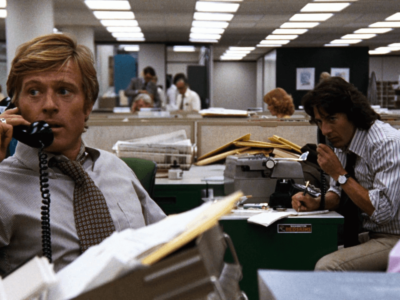Have you ever walked into a room and found that it was pretty much the opposite of what you expected? That’s how I felt after my first journalism class. The people were not who I thought they would be. I had a set idea in my mind of what a journalist did. What I didn’t realize is that the field encompasses much more than I could have imagined.
My idea of a journalism class was a bit like an old-fashioned newsroom—a group of people hunched over their computers and irritable because they have a deadline to meet. What I found instead in my introductory journalism class of almost 250 students were quite a few sleepy-eyed, coffee-toting sorority girls who looked as if they hadn’t picked up a pencil in their lives, and large groups of students who I couldn’t picture racing to get their next story assignments.
Where were the students ready to dive straight into hard-hitting journalism that exposed corruption and human rights violations? Where were the men and women who were so passionate about journalism that they’d do whatever it took to get what they needed to make a story?
I felt my dream shatter as I walked into the auditorium that first day. I counted all of the blonde heads and Starbucks cups and thought to myself, Surely I’m in the wrong room! But it wasn’t. Did I make a mistake when I chose my major, then? I obviously knew what I wanted to do after college, but my peers and I should have more similarities, right? I began to question whether or not I even belonged with this group. Yeah, they could be hard-working at times, and we had a few similarities, but was it enough? We’re all aspiring to join the same industry after college. If I don’t have anything in common with them, was I making the right career choice?
For years I had known that journalism was what I wanted to pursue. I found it almost by accident. I had been struggling to finalize my year-long research project junior year of high school. I wanted to tell a story of some kind, but I knew that a creative writing story wouldn’t be good enough. I needed to think bigger. So my teacher suggested that I write a news article, and I found that I really enjoyed it. I loved the preparing, the interviewing and the writing (of course). I had found my love—talking to and writing about people—from important local political figures to a local Holocaust survivor to a woman who rehabilitated victims of sex trafficking.
After a semester with my fellow journalism students, I came to a very important realization. While my expectations for my first day of class quickly fell through, I learned that not everyone can aspire to be Woodward and Bernstein. And while I have yet to meet the Bernstein to my Woodward, perhaps I have met our future Giuliana Rancic, Adeline Daley or others.
Having a love for entertainment, sports, art, food and music is just as important as serious news in journalism. People want to read guides on how to become a barista, reviews on the latest and greatest in music from experts, and wry political satire. I’m thankful for that, because if these pieces are what it takes for some to glance at the front page of a newspaper, then these out-of-the-box journalists are doing something right.
There’s Jacob, who can’t wait to be on sports radio. Caleb has a flair for the dramatic, when it comes to writing and just about everything else. And when she can, Erin combines her two passions: journalism and dance. And there are others who can’t wait to write, talk and broadcast about music, sports, celebrities, television and so much more. And yes, there are a few students who just might end up being my partner investigating crime and corruption.
The truth is that journalism is such a diverse field, and the sooner I realized that, the quicker I learned to appreciate it and my peers. That’s what is so unique about journalism—you can enter into the field and do virtually anything with it. There’s always an opportunity to explore your passions.



















